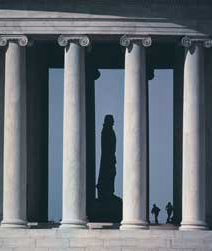Adams and Jefferson
Washington retired in 1797, firmly declining to serve for more than eight years as the nation's head. Thomas Jefferson of Virginia (Republican) and John Adams (Federalist) vied to succeed him. Adams won a narrow election victory. From the beginning, however, he was at the head of a party and an administration divided between his backers and those of his rival, Hamilton.
Adams faced serious international difficulties. France, angered by Jay's treaty with Britain, adopted its definition of contraband and began to seize American ships headed for Britain. By 1797 France had snatched 300 American ships and broken off diplomatic relations with the United States. When Adams sent three commissioners to Paris to negotiate, agents of Foreign Minister Charles Maurice de Talleyrand (whom Adams labeled X, Y, and Z in his report to Congress) informed the Americans that negotiations could only begin if the United States loaned France $12 million and bribed officials of the French government. American hostility to France rose to an excited pitch. The so-called XYZ Affair led to the enlistment of troops and the strengthening of the fledgling U.S. Navy.
In 1799, after a series of sea battles with the French, war seemed inevitable. In this crisis, Adams rejected the guidance of Hamilton, who wanted war, and reopened negotiations with France. Napoleon, who had just come to power, received them cordially. The danger of conflict subsided with the negotiation of the Convention of 1800, which formally released the United States from its 1778 defense alliance with France. However, reflecting American weakness, France refused to pay $20 million in compensation for American ships taken by the French Navy.

The silhouette of one of the United States' most revered Founding Fathers, Thomas Jefferson, stands in the shrine dedicated to his memory. "I have sworn upon the altar of God, eternal hostility against every form of tyranny over the mind of man." (© Robert Llewellyn)
Hostility to France had led Congress to pass the Alien and Sedition Acts, which had severe repercussions for American civil liberties. The Naturalization Act, which changed the requirement for citizenship from five to 14 years, was targeted at Irish and French immigrants suspected of supporting the Republicans. The Alien Act, operative for two years only, gave the president the power to expel or imprison aliens in time of war. The Sedition Act proscribed writing, speaking, or publishing anything of "a false, scandalous, and malicious" nature against the president or Congress. The few convictions won under it created martyrs to the cause of civil liberties and aroused support for the Republicans.
The acts met with resistance. Jefferson and Madison sponsored the passage of the Kentucky and Virginia Resolutions by the legislatures of these two states in November and December 1798. Extreme declaration of states' rights, the resolutions asserted that states could "interpose" their views on federal actions and "nullify" them. The doctrine of nullification would be used later for the Southern states' resistance to protective tariffs, and, more ominously, slavery.
By 1800 the American people were ready for a change. Under Washington and Adams, the Federalists had established a strong government, but sometimes failing to honor the principle that the American government must be responsive to the will of the people, they had followed policies that alienated large groups. For example, in 1798 they had enacted a tax on houses, land, and slaves, affecting every property owner in the country.
Jefferson had steadily gathered behind him a great mass of small farmers, shopkeepers, and other workers. He won a close victory in a contested election. Jefferson enjoyed extraordinary favor because of his appeal to American idealism. In his inaugural address, the first such speech in the new capital of Washington, D.C., he promised "a wise and frugal government" that would preserve order among the inhabitants but leave people "otherwise free to regulate their own pursuits of industry, and improvement."
Jefferson's mere presence in the White House encouraged democratic procedures. He preached and practiced democratic simplicity, eschewing much of the pomp and ceremony of the presidency. In line with Republican ideology, he sharply cut military expenditures. Believing America to be a haven for the oppressed, he secured a liberal naturalization law. By the end of his second term, his far-sighted secretary of the treasury, Albert Gallatin, had reduced the national debt to less than $560 million. Widely popular, Jefferson won reelection as president easily.
